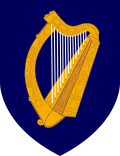Costello v. Government of Ireland
| Costello v. Ireland | |
|---|---|
 | |
| Court | Supreme Court of Ireland |
| Full case name | Patrick Costello v. Government of Ireland, Ireland and the Attorney General |
| Decided | 11 November 2022 |
| Citation | [2022] IESC 44 |
| Case history | |
| Appealed from | Costello v. Ireland [2021] IEHC 600 |
| Court membership | |
| Judges sitting | O'Donnell C.J., MacMenamin J., MacMenamin J., Dunne J., Charleton J., Baker J., Hogan J., Power J. |
| Case opinions | |
| |
| Decision by | Dunne J. |
| Concurrence | Baker and Hogan JJ. |
| Concur/dissent | Charleton J. |
| Dissent | O'Donnell C.J., Mac Menamin and Power JJ. |
| Keywords | |
Costello v. Government of Ireland [2022] IESC 44 is a decision of the Supreme Court of Ireland in which it held that Irish law precludes the ratification of the Comprehensive Economic and Trade Agreement, an agreement signed between Canada and the European Union on 30 October 2016.
The case had been taken by Patrick Costello, a Green Party TD.
High Court
[edit]Patrick Costello challenged the constitutionality of ratification of the Comprehensive Economic and Trade Agreement (CETA) by the government of Ireland.
In September 2021, the Irish High Court rejected the challenge.[1][2]
The judge, Nuala Butler, found that CETA did not entail an unconstitutional transfer of the State's sovereignty. She also found that tribunals established by CETA would not have jurisdiction to declare any provision of Irish law invalid. In addition she found that it was constitutionally appropriate and permissible for the State to ratify the agreement without a referendum.[1]
Supreme Court
[edit]In January 2022, the Supreme Court allowed direct appeal of this judgment to itself, bypassing the Court of Appeal in a "leapfrog" appeal due to "significant issues" regarding state sovereignty and the administration of justice raised in the case.[3][4] This appeal began being heard in March 2022.[5]
In November 2022, the Supreme Court upheld the challenge, finding by a 4–3 majority that ratification of CETA would be unconstitutional as Irish law currently stands. The court however found by 6–1 that if amendments were made to the Arbitration Act 2010, it would then be constitutional to ratify CETA.[6] Gerard Hogan, one of the judges of the court, wrote in his decision that it "may yet be regarded as among the most important which this court has been required to hear and determine in its 100-year history".[7]
Political reaction
[edit]Leo Varadkar, Tánaiste and Minister for Enterprise, Trade and Employment, said that the government remained committed to the deal.[8]
References
[edit]Citations
[edit]- ^ a b "Green Party TD loses court challenge over CETA deal". Raidió Teilifís Éireann. 16 September 2021. Retrieved 22 September 2021.
- ^ "Costello -v- Government of Ireland & Ors [2021] IEHC 600". Courts Service of Ireland. Retrieved 12 November 2022.
- ^ Reporter, Brian Mahon, Political. "Supreme Court allows 'leapfrog' appeal from High Court over Ceta trade deal". The Times. ISSN 0140-0460. Retrieved 21 April 2022.
{{cite news}}: CS1 maint: multiple names: authors list (link) - ^ "Costello -v- Government of Ireland & Ors [2022] IESCDET 1". Courts Service of Ireland. Retrieved 12 November 2022.
- ^ O'Loughlin, Ann (29 March 2022). "Green TDs appeal against EU-Canada trade deal opens in Supreme Court". Irish Examiner. Retrieved 21 April 2022.
- ^ O'Donnell, Orla (11 November 2022). "Costello wins court challenge over CETA ratification". RTÉ News.
- ^ Carolan, Mary (11 November 2022). "Ceta appeal may be among 'most important' in Supreme Court's history, judge says". The Irish Times. Retrieved 12 November 2022.
- ^ Murphy, David (12 November 2022). "Greens face internal divisions over trade deal". RTÉ News. Retrieved 12 November 2022.
Judgment of Supreme Court
[edit]- 124/2021 Costello v. Ireland (Judgment of the Supreme Court) on YouTube – Summary of decision of the court, delivered by the Chief Justice
- Authorised summary – Provided by the court to assist in understanding the court's decision. It does not form part of the reasons for the decision. The full judgment of the court is the only authoritative document.
- O'Donnell C.J.
- MacMenamin J.
- Dunne J.
- Charleton J.
- Baker J.
- Hogan J.
- Power J.
